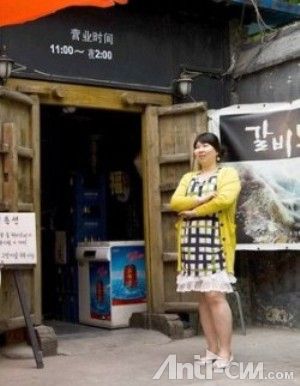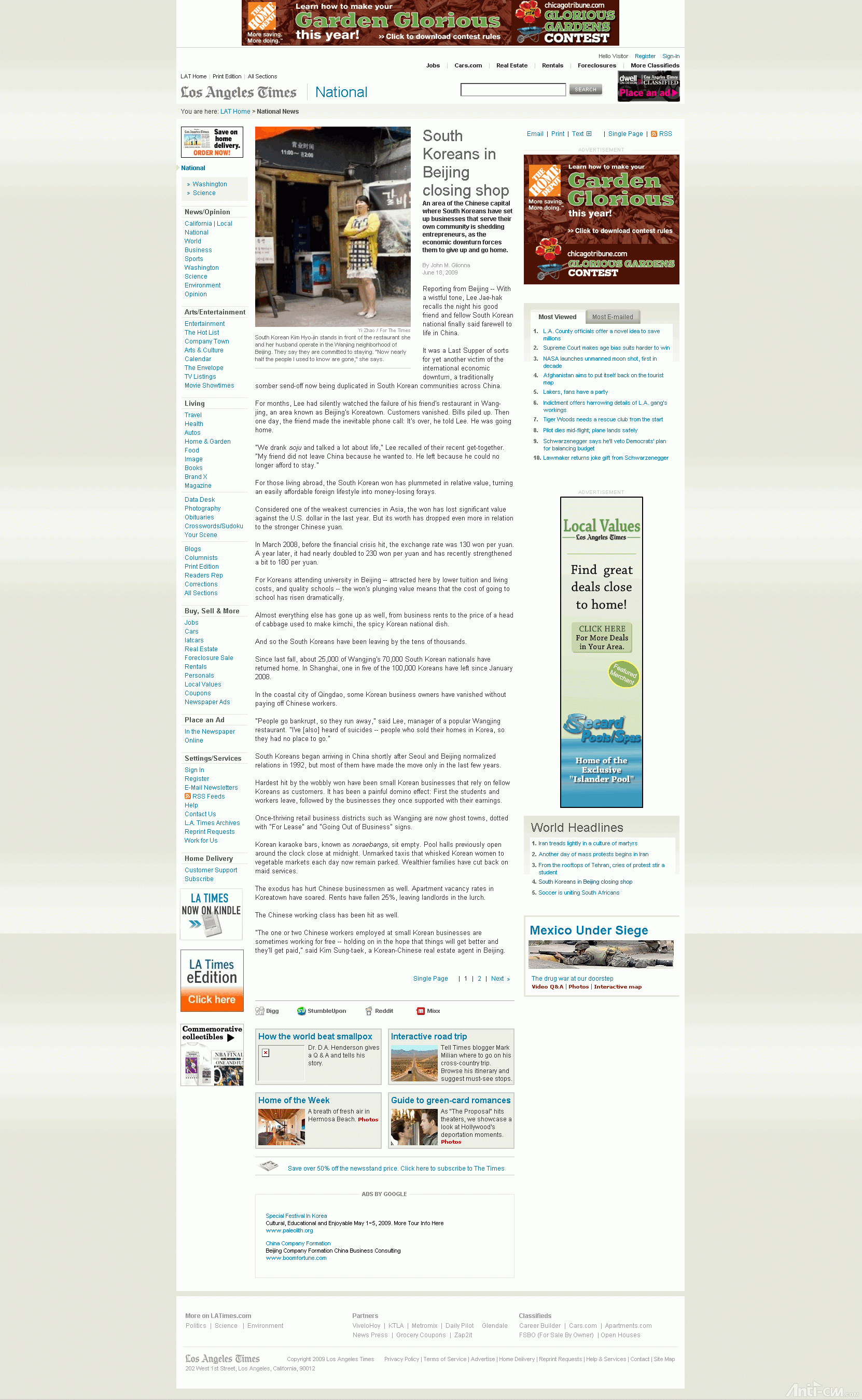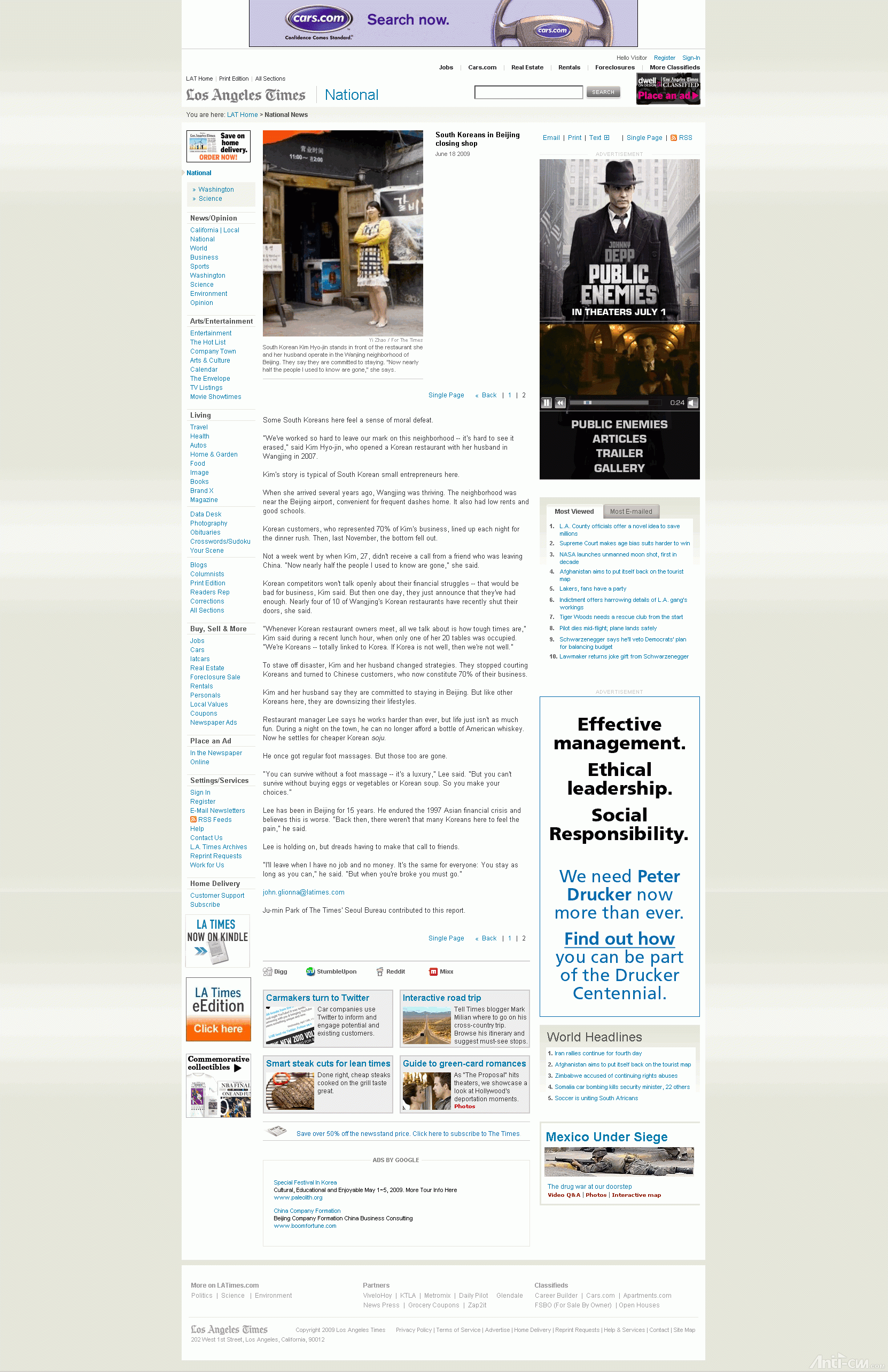|
|
South Koreans in Beijing closing shop
An area of the Chinese capital where South Koreans have set up businesses that serve their own community is shedding entrepreneurs, as the economic downturn forces them to give up and go home.
http://www.latimes.com/news/nationworld/nation/la-fg-china-koreatown18-2009jun18,0,268003.story
By John M. Glionna June 18, 2009

South Korean Kim Hyo-jin stands in front of the restaurant she and her husband operate in the Wanjing neighborhood of Beijing. They say they are committed to staying. “Now nearly half the people I used to know are gone,” she says.
Reporting from Beijing -- With a wistful tone, Lee Jae-hak recalls the night his good friend and fellow South Korean national finally said farewell to life in China.
It was a Last Supper of sorts for yet another victim of the international economic downturn, a traditionally somber send-off now being duplicated in South Korean communities across China.
For months, Lee had silently watched the failure of his friend's restaurant in Wang- jing, an area known as Beijing's Koreatown. Customers vanished. Bills piled up. Then one day, the friend made the inevitable phone call: It's over, he told Lee. He was going home.
"We drank soju and talked a lot about life," Lee recalled of their recent get-together. "My friend did not leave China because he wanted to. He left because he could no longer afford to stay."
For those living abroad, the South Korean won has plummeted in relative value, turning an easily affordable foreign lifestyle into money-losing forays.
Considered one of the weakest currencies in Asia, the won has lost significant value against the U.S. dollar in the last year. But its worth has dropped even more in relation to the stronger Chinese yuan.
In March 2008, before the financial crisis hit, the exchange rate was 130 won per yuan. A year later, it had nearly doubled to 230 won per yuan and has recently strengthened a bit to 180 per yuan.
For Koreans attending university in Beijing -- attracted here by lower tuition and living costs, and quality schools -- the won's plunging value means that the cost of going to school has risen dramatically.
Almost everything else has gone up as well, from business rents to the price of a head of cabbage used to make kimchi, the spicy Korean national dish.
And so the South Koreans have been leaving by the tens of thousands.
Since last fall, about 25,000 of Wangjing's 70,000 South Korean nationals have returned home. In Shanghai, one in five of the 100,000 Koreans have left since January 2008.
In the coastal city of Qingdao, some Korean business owners have vanished without paying off Chinese workers.
"People go bankrupt, so they run away," said Lee, manager of a popular Wangjing restaurant. "I've [also] heard of suicides -- people who sold their homes in Korea, so they had no place to go."
South Koreans began arriving in China shortly after Seoul and Beijing normalized relations in 1992, but most of them have made the move only in the last few years.
Hardest hit by the wobbly won have been small Korean businesses that rely on fellow Koreans as customers. It has been a painful domino effect: First the students and workers leave, followed by the businesses they once supported with their earnings.
Once-thriving retail business districts such as Wangjing are now ghost towns, dotted with "For Lease" and "Going Out of Business" signs.
Korean karaoke bars, known as noraebangs, sit empty. Pool halls previously open around the clock close at midnight. Unmarked taxis that whisked Korean women to vegetable markets each day now remain parked. Wealthier families have cut back on maid services.
The exodus has hurt Chinese businessmen as well. Apartment vacancy rates in Koreatown have soared. Rents have fallen 25%, leaving landlords in the lurch.
The Chinese working class has been hit as well.
"The one or two Chinese workers employed at small Korean businesses are sometimes working for free -- holding on in the hope that things will get better and they'll get paid," said Kim Sung-taek, a Korean-Chinese real estate agent in Beijing.
Some South Koreans here feel a sense of moral defeat.
"We've worked so hard to leave our mark on this neighborhood -- it's hard to see it erased," said Kim Hyo-jin, who opened a Korean restaurant with her husband in Wangjing in 2007.
Kim's story is typical of South Korean small entrepreneurs here.
When she arrived several years ago, Wangjing was thriving. The neighborhood was near the Beijing airport, convenient for frequent dashes home. It also had low rents and good schools.
Korean customers, who represented 70% of Kim's business, lined up each night for the dinner rush. Then, last November, the bottom fell out.
Not a week went by when Kim, 27, didn't receive a call from a friend who was leaving China. "Now nearly half the people I used to know are gone," she said.
Korean competitors won't talk openly about their financial struggles -- that would be bad for business, Kim said. But then one day, they just announce that they've had enough. Nearly four of 10 of Wangjing's Korean restaurants have recently shut their doors, she said.
"Whenever Korean restaurant owners meet, all we talk about is how tough times are," Kim said during a recent lunch hour, when only one of her 20 tables was occupied. "We're Koreans -- totally linked to Korea. If Korea is not well, then we're not well."
To stave off disaster, Kim and her husband changed strategies. They stopped courting Koreans and turned to Chinese customers, who now constitute 70% of their business.
Kim and her husband say they are committed to staying in Beijing. But like other Koreans here, they are downsizing their lifestyles.
Restaurant manager Lee says he works harder than ever, but life just isn't as much fun. During a night on the town, he can no longer afford a bottle of American whiskey. Now he settles for cheaper Korean soju.
He once got regular foot massages. But those too are gone.
"You can survive without a foot massage -- it's a luxury," Lee said. "But you can't survive without buying eggs or vegetables or Korean soup. So you make your choices."
Lee has been in Beijing for 15 years. He endured the 1997 Asian financial crisis and believes this is worse. "Back then, there weren't that many Koreans here to feel the pain," he said.
Lee is holding on, but dreads having to make that call to friends.
"I'll leave when I have no job and no money. It's the same for everyone: You stay as long as you can," he said. "But when you're broke you must go."


|
beijing, closing, Koreans, South, 洛杉矶时报, beijing, closing, Koreans, South, 洛杉矶时报, beijing, closing, Koreans, South, 洛杉矶时报
|